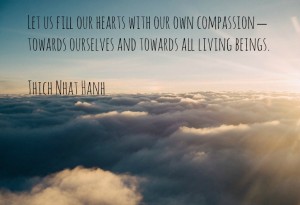In Part 1 of this series, I examined the current discouraging data regarding weight loss. Since it looks pretty bleak out there in the media, I hope to provide an optimistic voice in this arena. Much of what is perceived as “failure” is merely an indication that our current treatment of the issue is faulty. Finding a lasting healthy weight is 100% attainable with the proper interventions and support.
That leads us to the following two questions:
1) Do you actually need to lose weight? –because thinner is not necessarily healthier, and
2) How can you feel confident and hopeful about your ability to lose weight, should you chose to do so?
In order to address these issues, we need to build from the proper foundation. Weight loss is a step on the path, not the path itself. The path itself is one of self-care, built on a solid foundation of mindful compassion.
The Foundation
How many of us can truly say that we love ourselves? Some of us don’t even like ourselves. Unless we address that core issue, doing what is necessary to improve our health will be a continual up and down roller coaster. We may be chasing a number on a scale, or a clothing size, that bears no relation to our health and well-being.
Once we begin a mindfulness practice and start observing our own self-talk, it becomes apparent how harsh we are with ourselves. During one of our class sessions, a participant pointed out that if we spoke to a friend or family member with the same harshness and chronic negativity, it would be downright appalling. We would never do it because it is abusive. Indeed– but much of our negative self-talk flies under the radar because we simply don’t notice it. And what we don’t notice is what is guiding our actions. How crazy is that?
A mindfulness practice helps us to shine the light of awareness on our habitual self-talk. It can be pretty discouraging at first, so don’t be surprised if you notice a lot of mental “junk” going on. I remember when I went on my first meditation retreat. I had no idea what I was in for, having signed up for it as an enthusiastic and clueless newbie. I thought we would meditate for an hour a day tops–not all at once, and then go for some walks, listen to a few lectures, etc. But no. It was one meditation session followed by another, broken up only by meals and brief silent walks around the room. For three days.
The first day and a half were awful. I was restless, bored, and forced to confront my negative, ADD-like mind. But then, things calmed down a bit and I settled in a little more into the practice of compassionate awareness. Mindfulness is an evolving practice, but the first few steps are the hardest as we come face to face with what has been automatic, and is often quite ugly.
What begins to happen–over time—is that you stop fighting with yourself. Another point made during this week’s class was that “what you resist, persists.” When negative thoughts arise, rather than fight them, you smile inside say “Oh, hi, self-sabotage, negative body image, etc. There you are again.” and move on. From there, compassion grows. And from compassion, you can begin a new lifestyle of self-care and address the issue of weight loss holistically.
Question 1: Do you actually need to lose weight, and if so, how much?
With self-care as your guiding principle, rather than trying to fit into a media-generated body type, you can do what is best for your health. There are many studies that indicate that increased weight is not necessarily a health problem. Thus, the changes you make might not be for “weight loss” but for improved health. The methods, however, might be the same.
Only you–in consultation with your doctor–can determine your ideal weight range. Some questions to consider are: What are the results of your annual physical? Are you happy with your body? Do you feel good, energetic, confident, and strong? Do you have any medical conditions, such as diabetes, sleep apnea, joint pain, reflux, etc. that weight loss might help? What are your unique life circumstances (new parent, job stress, middle age, post-surgery, etc.), and how do these affect your weight?
Disregard the scale, unless you personally find the scale helpful. And even if you use the scale, use it as a supplementary tool rather than the final arbiter of success. Ignore media images of ideal bodies, and learn to love your body for what it can do, and how it feels, rather than how it compares to others.
Use the tool of mindfulness to inspect your diet, and explore how food affects your mood, energy levels, and overall functioning. For me personally, when I altered my sugar and processed carbohydrate intake, I noticed a big improvement in energy and mental focus. For you, it might be different. Regardless of the changes you make, when you set goals because you love yourself, those are worthy goals– beyond a particular number on a BMI chart.
In the final section of this article, we will explore how to generate confidence and an optimistic attitude about your ability to lose/maintain weight.

